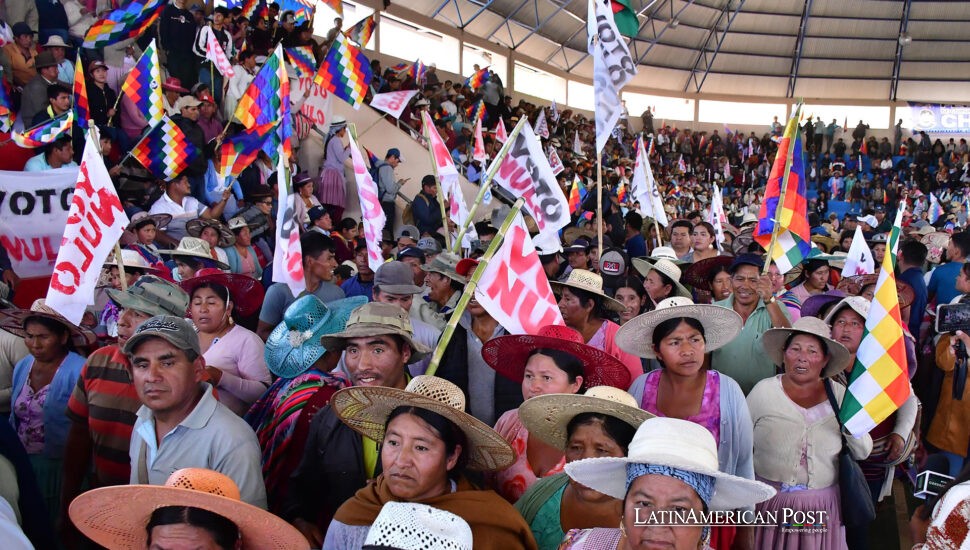Bolivian Election Day Drama Explained As Morales Guarded Amid An Arrest Warrant

On a day thick with tension, Evo Morales moved toward the polls encircled by a human shield of loyalists. He carried a red marker, vowed to annul his ballot, and defied an arrest warrant that stalks his every step.
A syndical security cordon around a “political father”
They arrived at dawn, white shirts catching the first light as they fanned out across the dusty streets of Lauca Ñ. Radios crackled, pickups idled, motorbikes revved in formation. Some held Bolivia’s multicolored wiphala high; others tightened the human barrier with practiced discipline.
Their task was simple, their purpose absolute: guard Evo Morales, the former president they still call their “political father.”
“It’s not only Evo—he is our ideological, political, organic father; that’s why we must take care of him. It’s not an obligation, it’s a duty,” Germán Felipe Mamani told EFE, standing at the center of the 150-person guard he had trained for this day.
This “seguridad sindical,” born from the union world that has always been Morales’ bastion, shadowed him from Lauca Ñ to Villa 14 de Septiembre, the town where Morales has long cast his votes. They spread out in a choreographed cordon, forming a living wall between the former president and onlookers. The barrier flexed for children who rushed forward for a wave, then closed again like a muscle.
The moment was both festive and defensive. Here was a leader facing legal peril, but still carried on the shoulders of a movement that refuses to let him walk alone.
A warrant, a red marker, and a bid to nullify
Hovering over the day was a judicial order that Morales’ supporters openly reject. He faces an arrest warrant in a human-trafficking case linked to an alleged relationship with a minor, with whom he is said to have fathered a child in 2016 while in office. Morales insists the case was closed in 2020 and only revived to block him from returning to the ballot. To him, it is less justice than political sabotage.
So he brought a weapon of his own: a red marker. He lifted it often, brandishing it like a flag. Its purpose was symbolic but sharp—he would use it to spoil his ballot, and he urged his followers to do the same.
The null vote, he explained, was the collective expression of grassroots groups that wanted him as a candidate but found themselves sidelined as eight other contenders crowded the ballot. Spoiling the vote, Morales told EFE, was not abstention but protest, a way to speak from inside the process while rejecting its terms.
Meanwhile, he cast suspicion on the military and police presence at polling sites. “I trust in the election,” he said, “but it lacks legitimacy.” The contradiction summed up the tension: Morales urging civic participation with one hand, nullification with the other. Whether the push will register as noise or as leverage will only become clear once ballots are counted.
From a radio mic to the ballot line
Before he joined the ballot line, Morales spoke into a microphone. His Sunday radio program, a ritual broadcast from a union hall near Villa 14, went on as usual. Tin roofs rattled with feedback as lawmakers and Trópico leaders sat on folding chairs. The show blended a sermon and a strategy session, his voice amplified into the morning.
At 9:15 A.M., his caravan rolled to the Escuela Villa 14 de Septiembre. The guard tightened, creating two corridors: one for Morales and his entourage, the other for journalists and the cellphones hoisted above the crowd.
Applause rippled through the voters already queued against the school wall. Some gasped to see the former president in their precinct. Poll workers blinked in surprise as Morales approached his assigned table.
The guard kept him moving, ushering him to cast his vote. When he emerged minutes later, the red marker was visible again, raised in the air like a verdict. The scene captured Bolivia’s dissonance: a simple schoolyard as stage for national politics, a legal case haunting every checkpoint, and a movement that refuses to dissolve even as the state insists on its writ. That no arrest attempt came only underscored why the human shield had been there at all.
What comes after the vote
When his ballot was cast and his marker displayed, Morales returned to Lauca Ñ, where supporters prepared a vigil to await the results. By Wednesday, his Evo Pueblo bloc promised a national meeting to interpret the vote and chart strategy.
The official stakes of the day were immense: Bolivians elected a president, vice president, and new legislature for the 2025–2030 term. But in Morales’ home ground of the Trópico de Cochabamba, the questions felt sharper: Could the movement flex its muscles without fracturing? Could the state guarantee a fair vote while upholding the law against its most polarizing figure?
The choreography revealed the strain. A syndical guard, radios buzzing. Flags and applause in the streets. A red marker lifted above their heads as if it were a torch. To Germán Felipe Mamani, who spoke of duty to EFE in the plain tone of a farmer explaining his harvest, protecting Morales is both an obligation and a faith. The legal system, by contrast, speaks in warrants, charges, and articles of code. Between those registers lies the electorate itself, watching politics play out not in courtrooms or palaces but in schoolyards and on the airwaves.
Also Read: Mexico Case Unravels Cartel Empire from Tennessee Crash to Kingpins
Whatever the final tally, Morales and his allies have already framed the null vote as their verdict: against a ballot they reject, against a process they mistrust, and for a movement they believe still shapes Bolivia’s destiny. Sunday’s shield wall—rows of white shirts and a red marker lifted high—was less a spectacle than an opening argument in the struggle to come.




